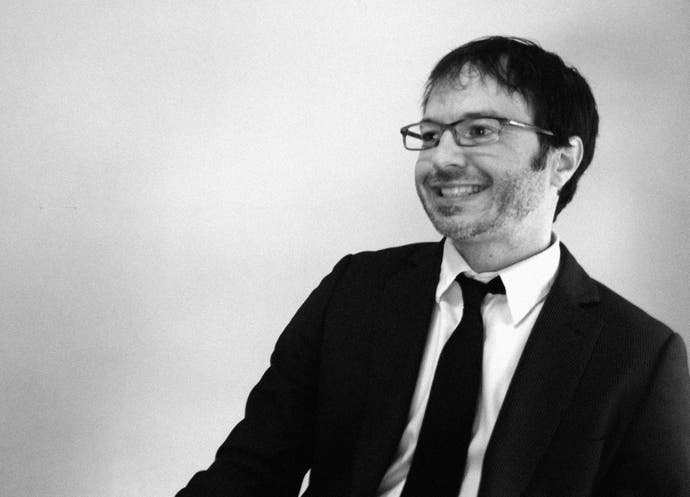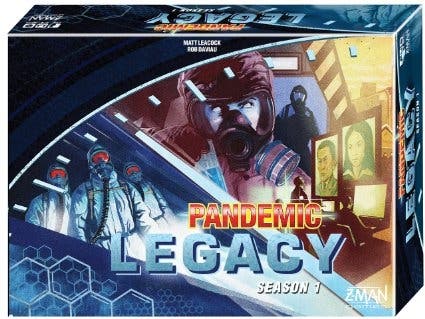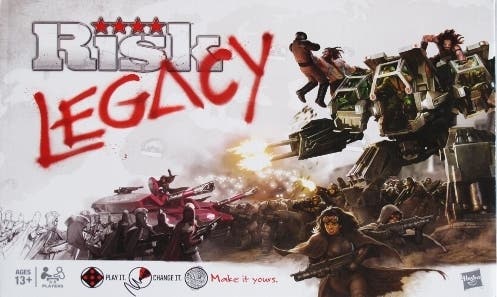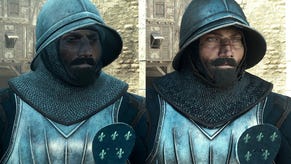The Legacy of Rob Daviau, the man who helped flip boardgames on their head
Pushing the envelope.
There's a common joke made about Monopoly that it destroys lives. The massively popular love-letter to capitalist greed has become notorious for its ability to ruin friendships, end relationships, and shatter family-ties like brittle glass. Whether Monopoly truly is a cardboard home-wrecker is up for debate, but what is certain is that, whatever damage Monopoly does or doesn't do, when the game is over and the emotional smoke has cleared, the board and pieces go back into the box unchanged.
But you can't shelve life. You can't fold everything neatly away, or place memories in little plastic bags and fit them into the appropriately moulded inserts. Everything that happens to you stays with you, and that extends to playing a game like Monopoly. When you next work up the courage to unfold that time-bomb of a board, it might not have changed, but you will have. You'll know your dad will try to buy all of the train stations, and that your mum always builds a hotel on Old Kent Road. So you'll shift your strategy to counter those tendencies, and your family will change their tactics to counter yours.
It was a similar observation, only about Cluedo, that led boardgame designer Rob Daviau to have an idea - what if the game changed along with the player's experience of it? "In a brainstorm for Cluedo we were talking, and I made the comment of 'I dunno why they keep inviting these people to dinner, they're all mass murderers,' Daviau says. "And it was this moment where I went 'Oh yeah!' The game kind of starts over like the movie groundhog day. But the players don't start over." This idea has resulted in what is undoubtedly the most radical board gaming innovation of recent years, that of Legacy gaming. Thus far Daviau has explored the idea in two stellar games, Risk Legacy and Pandemic Legacy, and he's currently working on a third, Seafall.

Although Daviau's work has only come to prominence fairly recently, he has been designing boardgames for almost 20 years. Having initially worked as an advertising copywriter, in 1998 Daviau joined Hasbro as a writer for text-heavy games like Trivial Pursuit and Taboo, a unique role that the company hasn't hired for before or since. "I happened to fit that bill and very quickly realised that I loved the design part more than the writing part," he says. "I moved my job as fast as I could to be a pure designer and learned as I went."
In his time as Hasbro, Daviau worked on dozens of titles, including versions of well-known games like Cluedo, and "more Risk versions than anyone else." Yet while most of Daviau's design experience resides with family-friendly games with fairly simple rulesets, his heart has always belonged to roleplaying games like Dungeons and Dragons. "Roleplaying games have persistent worlds," Daviau explains. "You write on a character's sheet. I remember when I was a kid and a character would die, someone ripped it in half and it was very dramatic."
It's these dual strands to Daviau's boardgaming background, his love for deep, persistent RPG worlds and his experiences designing simpler, general-audience games, that would prove crucial to seeing the Legacy concept realised. Daviau's Cluedo-based realisation happened around 2008, and he pitched the idea of Cluedo Legacy to Hasbro's management, but they rejected it outright. "They looked at me like I was crazy," Daviau says. "So I thought 'Well, maybe this is a crazy idea.' And I put it away."
While initially sceptical, the idea stuck in the minds of Daviau's superiors. A couple of years later, it rose to the surface again when discussing potential new versions of Risk. "My boss asked me to come up with ideas. And I think he remembered it and he said 'Well how about that perpetual game idea?' Daviau thought about this, and realised that Risk would make for an ideal template for a Legacy game, because of its strategic elements and how emotional it makes people when they play it.
"It just makes people mad," Daviau says. "It makes you mad when the dice don't go your way. And it makes you mad when someone breaks their word. So you just carry these memories and scars around." Risk Legacy would play with this idea, enabling players to physically "scar" the board, affecting the rules of future games. The more games they played, the more dramatic those effects would become. Players could found cities on the board, tear up cards into confetti, unlock new factions to play as, even detonate a nuclear device in a particular country, making it almost impossible to hold in future games. "I had a big toolbox of ideas that I could draw on having done six or seven or eight earlier Risk games," Daviau says.
Risk Legacy took around 18 months to develop, with Daviau working on almost every aspect of it, from writing the cards to directing the art and even making sales videos. "I was quite excited by it as a new possibility, but there was always that spectre looming of 'This is the dumbest thing I've ever thought of, and everyone who plays it is going to laugh me out of the industry.' Quite the contrary, Risk Legacy released in 2011 to rave reviews, and by the end of 2012 it was one of the most talked-about games around. Commercially its success was a drop in the ocean for Hasbro, but Daviau sees this as a good thing. "I got to go beneath the radar, which was good, because I wouldn't have gotten it out if there had been a lot of attention on it."

After the launch of Risk Legacy, Daviau departed Hasbro, striking it out as an independent boardgame designer. He began working on a new Legacy game, but this was interrupted at GenCon 2013, when Daviau was contacted by Matt Leacock, the creator of the massively successful Pandemic, about the possibility of co-designing a Legacy version of his cooperative boardgame about saving the world from a global disease outbreak. "I wrote back in an email, which I had forgotten but that he always talks about, in 150 point type. It said 'YES', and that was the entire email," Daviau recalls.
The idea of merging Pandemic's simple yet engrossing rules with Daviau's legacy concept may sound like a recipe for instant success. But Pandemic Legacy proved a far more tricky design problem because of its cooperative emphasis. "There's so much outside the designers control on a Legacy game, that I need other players to be a balancing agent. In Risk Legacy if someone starts winning a lot the other players will gang up on them," Daviau explains. In Pandemic, however, the players are all working together to outsmart the game's systems, and with a Legacy game's gradual upping of the ante, it's very easy to end up with one side simply overwhelming the other.
Leacock and Daviau tackled this problem by introducing two new game mechanics. Firstly, funding for players changes each game. If players win a game of Pandemic Legacy, they are given fewer 'Event' cards for the next game. If they lose, they receive more. This helps nullify the common game-design problem of snowballing, where winning leads to more winning and losing leads to further losing.
Their other solution was to provide players with a broad range of tools so they could choose how to approach problems specific to their game. "If you're playing the game and you're not having trouble curing diseases, but you're really having trouble moving around the board. Then you can make research stations permanent, so you'll start the next game with the ability to move. And another group might have no problem moving but having trouble with the diseases. So they will make the diseases easier to treat in the next game," Daviau points out.
Pandemic Legacy launched in October 2015, releasing simultaneously in around 13 different languages across the globe. Unlike Risk Legacy, which gained its reputation over a couple of years, Pandemic Legacy was an instant hit. Despite being out less than six months, it is currently rated by BoardGameGeek as the best game in existence. ShutUpAndSitDown also voted it their favourite game of 2015, toppling longtime favourite Cosmic Encounter.
What's particularly fascinating about the success of Daviau's Legacy concept is that its two current incarnations are reinterpretations of already existing games. We've yet to see a Legacy game that is built entirely from scratch, with those persistent rules baked into the base version. However, that will change later this year when Daviau releases Seafall, the first Legacy game designed from the ground up, and the first game Daviau has created entirely by himself.
Set in alternate universe based on Europe's colonial period in the 16th and 17th centuries, Seafall sees players controlling individual provinces, sending ships around the fictional globe to explore, trade with and conquer new territories. Starting out with a board that comprises mostly of empty ocean, players will gradually discover new islands, trade routes, and dozens of other things as the game progresses. To give you an idea of how expansive Seafall is, it includes a 427-page 'Events' book inspired by the classic storytelling game Tales of the Arabian Nights.

"What I noticed in Risk Legacy is people liked opening things and liked finding things. When you open the boxes, or the envelopes, it was always the most exciting bit," Daviau says. "So I thought 'Well what if I started with a game where you really had as little as possible, just kind of an empty sea. So you weren't just going to find six things - you're going to find four hundred things?' These discoveries are multilayered too. If a player finds a new island in the ocean, they will be able to explore that island, at which point they might stumble upon an ancient tomb, the tomb might lead to treasure, which provides that player with rewards, and so on.
Initially Daviau planned Seafall to be a vast, complex 4X game with the Legacy mechanic worked into it. But this quickly proved far too cumbersome. He noticed that a Legacy game works best when the basic ruleset is simple, and the complexity is gradually layered in over several games. Take Seafall's ships, the base unit players use to explore the board. In Daviau's early prototypes, ships were intensely micromanaged; everything from crew to ammo to cargo could be replaced and expanded. Now, however, ship modifiers are based on the names that each vessel is given. Alongside the ship's starting name like "Viper" or "Sparrow", two further adjectives can be added "Intrepid" or "Stalwart", each of which provides a different bonus to that ship's particular abilities. "A big game design problem is 'more is better', snd so I had to learn a little bit the hard way on Seafall that less is just fine," Daviau says.
Daviau is currently putting the finishing touches to Seafall, with a plan to launch the game at this year's GenCon in August. And there are more Legacy games coming. Daviau is already working on Season 2 of Pandemic Legacy with Matt Leacock. He's also working with another designer, Dirk Knemeyer, on a tiny little idea called Chronicles, which sees players recreate their own version of western civilisation.
In the first Chronicles box, titled Origins, players assume control of Stone Age tribes. "You will play eight games, and each game will generate a different tribe with its own background and personality and quirks and outlook on the world. And then, after you have eight tribes, you will take a certain number of them... and those will fast-forward several thousand years to be Bronze Age Kingdoms, and these Kingdoms will have different outlooks and personalities based on what happened to them thousands of years ago."
Just four years ago Daviau was working for Hasbro designing Star Wars and Lord of the Rings variations of Risk. Now he is designing his own games, exploring the entirety of history. "I'm just a guy working out of his house, and trying to make enough money to, y'know, keep the house, and so I don't have time right now for any perspective," he says of the shift in fortunes. " But if you told my twelve-year-old self 'what do you want to be doing when you grow up,' this would have been it."









